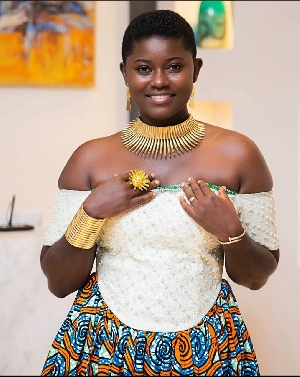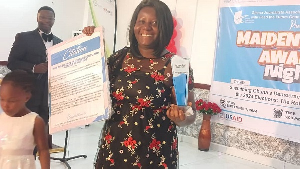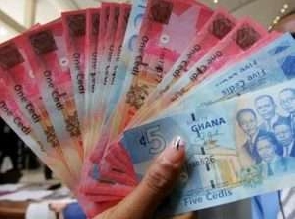With the advent of social media, where all manner of hate speech, disinformation, misinformation, and polarizing narratives are churned out, it is the duty of all of us to take deliberate steps to avoid polarizing narratives and weaponization of social media."
"As we approach the elections, professionalism and ethical standards must be a priority to all of us, as the freedom of the media would be meaningless if our actions and inactions drive our dear country into chaos," President of the Ghana Journalists Association, Albert Kwabena Dwumfour, has said.
He made the call on Saturday, September 7, 2024, during the maiden Upper West Regional GJA awards held in Wa in a speech read on his behalf.
On the upcoming general elections, Kwabena Dwumfour assured his outfit's commitment to whipping its members in line to ensure incident-free coverage of the polls.
While calling on the country's security to offer media personnel the needed protection to perform their work effectively in the upcoming elections, he charged the inky fraternity to carry out their work in a balanced, accurate manner, warning them against sensationalism as well.
Mr. Dwumfour stated: "Let me emphasize that whilst the media plays its role to tighten the fabric that holds all of us together, it is important for the safety of journalists and media practitioners to be guaranteed. The judiciary and security services, particularly the Ghana Police, must ensure the safety of journalists in this tension-packed electioneering period. Let me also indicate, however, that the media must aim for fairness, impartiality, and accuracy in reporting while avoiding sensationalism in the run-up to the 2024 elections."
He expressed optimism that the media would "rise to the occasion and stay above reproach."
Recognizing the critical role media plays in shaping Ghana’s democracy through peaceful and fair elections as Ghana goes to the polls in December, the GJA President reminded journalists of their duty to hold leaders accountable whilst providing an enabling environment for all to achieve sustainable peace and national cohesion.
According to him, much as the media is enjoined to shape political discourses while providing platforms for citizens to air their opinions and exercise their rights of free expression, it is however vital that this is done with the utmost responsibility in line with best practices.
"Even though Chapter 12 of the 1992 Constitution guarantees the independence and freedom of the media, that does not give us the license to write or say things that have the potential to threaten the peace and security of the country," he added.
Prof. Africanus Lewil Diedong, Professor of Social Communications, Department of Communication at the Simon Diedong Dombo University of Business and Integrated Development Studies (SDD-UBIDS), who was the guest speaker in his insightful keynote address, said: "As regards peace journalism, I would like to associate myself with what Pope Paul VI said: 'If you want peace, work for justice.' A journalist answers to an even stronger value, truth. These three values—peace, justice, and truth—are intimately linked, but we all know that telling the truth does not always produce peace in the short term."
"But stay the cause, particularly in the lead-up to the general elections when some political elites and their associates—business tycoons—would overtly or covertly influence you to cave in or cower. Be fearless and act with integrity in the pursuit of peace journalism. Let me point out that peace without justice, peace without truth, will never last. Your commitment would be a positive testament to witnessing SDG goal 16: Peace, Justice, and Strong Institutions."
The Professor also cautioned that: "The media needs to take note that anytime it fails to conduct its business in a professional and responsible manner, the state can intervene to sanitise the media ecology in the public interest, justifying such external pressures with the limitations on rights and freedoms in article 164 of the 1992 Constitution of Ghana."
The awards ceremony:
The awards ceremony, which was dedicated to recognizing and celebrating journalists in the region for distinguishing themselves in their line of professional practice last year, saw four (4) journalists each winning two categories.
Ibrahim Wangara, TV3's reporter for Upper West, won the accolade for two categories: Excellence in Rural Reporting as well as Excellence in Tourism Reporting of the Year, whereas Philip Tengzu, from GNA, was adjudged the best reporter in both the Climate and Agric categories for the year.
For the Human Rights and Education reporting categories, Lydia Darlington Fordjour of Ghanaian Times emerged as Best Reporter for the Year, while Rafiq Salam of Joy News bagged the Best Reporter for the Year in Health and was also crowned the Overall Upper West Best Journalist of the Year.
Two veterans in the region also received honorary awards in the form of citations for their contributions to the noble profession in the region.
They are Bajin D. Pobia, a retired veteran journalist from Ghana News Agency (GNA), alongside Ivan Domasaa, former Programs Coordinator at Radio Progress, a Wa-based community radio station, the first to be established in the region.
The event brought together stakeholders, including traditional leaders, representatives from political parties, security services, CSOs, NGOs, and the media.
It was themed "Sustaining Ghana's Democracy before, during, and after the 2024 General Elections: The Role of Peace Journalism."
Click to view details



Regional News of Tuesday, 10 September 2024
Source: Ilyaas Al-Hasan, Contributor
Journalists urged to be circumspect in their reportage
Entertainment
















